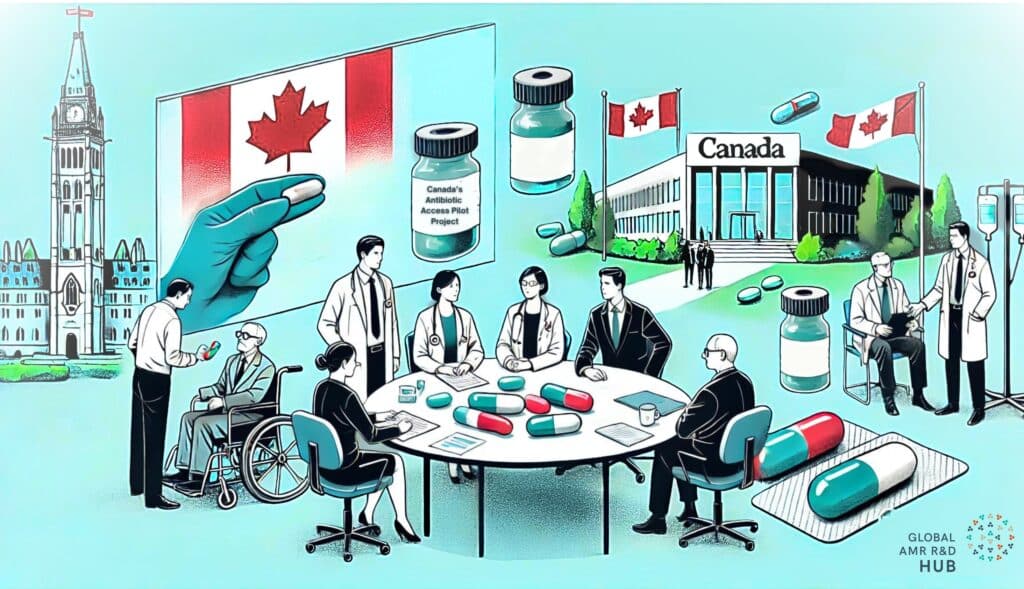
Impact
From data to action: Supporting the policy case for Canada’s antibiotic access pilot
Summary of the impact
The Global AMR R&D Hub (the Hub) played an important role in supporting the development of the policy case for Canada’s Antibiotic Access Pilot Project. Over a two-year period, the Hub engaged in multiple consultations with Canada, providing valuable insights into the investment landscape for AMR R&D, among other topics. Additionally, Canada’s AMR Task Force leveraged the Hub’s resources, such as the Dynamic Dashboard, its reports and network, during the policy formulation process. The partnership between the Hub and Canada’s AMR Task Force supported the policy case and rationale for a pilot project aimed at securing access to new antibiotics for Canadians.
Canada’s Antibiotic Access Pilot Project
Context
Like many countries worldwide, Canada is grappling with the silent pandemic of antimicrobial resistance (AMR). In 2018, Canada reported approximately one million cases of bacterial infections. These resistant infections led to over 14,000 fatalities, with healthcare expenses exceeding $2 billion. Nevertheless, there is a dearth of new antimicrobial drugs entering the market, and among those that do, a significant number do not seek approval in Canada [1]. By 2020, Canadians had access to only two of the 13 new antibiotics of last resort, while the US had access to all 13 [2].
Approach
Against this backdrop, the Canadian government established an AMR Task Force in 2021, led by Joël Denis, to develop a strategy to counter AMR. However, they faced a challenge from the beginning:
“The lack of data impeded our ability to fully understand the problem of access in the Canadian context, and how it compared to other countries. This made it difficult to develop Canada specific proposals for decision makers to consider.” Joël Denis, Director General of Vaccine and Therapeutics Readiness, Public Health Agency Canada (PHAC)
As a Board Member of the Global AMR R&D Hub, Canada sought support from the Hub’s Secretariat to better understand the investment landscape for AMR R&D, the current state of incentives for the development of and access to new antibacterials, and the challenges that other countries have experienced in the area of incentives.
In response, the Secretariat analyzed Canada’s AMR R&D investments using the Hub’s Dynamic Dashboard, revealing a restricted investment profile comprising only 1.4% of the global AMR R&D portfolio (in 2019), with limited investments into the R&D of new therapeutics, diagnostics and vaccines, and a lack of access to life-saving antibiotics. The Dashboard data and Hub studies also provided key insights into the gaps between drug discovery, commercialisation and access to new antibiotics globally. Challenges exacerbated by the features of the Canadian market, characterised by a small population and market share and fragmented health care systems. Additionally, the Hub organised Pull Incentives Working Group Meetings, which offered Canada further insights and contact with other key industry stakeholders such as the Canadian Antimicrobial Innovation Coalition (CAIC), as well as provinces and territories. Canada also leveraged other resources of the Hub, such as its 2023 paper, “A Shared Dialogue on Pull Incentives”.
The data and information sharing informed Canada’s strategy by highlighting that its AMR investment profile was not keeping up with growing needs of Canadians and that the costs of inaction would be significant.
Results
In 2023, in developing their proposal for senior official and political consideration the Canadian AMR Task Force drew on the Hub’s expertise to refine their proposal, validating data presented. The diligent efforts of the AMR Task Force, paved the way for an in-depth evaluation of what economic pull incentives would have the greatest potential for success in encouraging the market entry and sustained market availability of high-value antimicrobials for use in humans in Canada. The report [1] commissioned by the Public Health Agency of Canada and conducted by the Canadian Council of Academies, ultimately led to the approval of Canada’s Antibiotic Access Pilot Project. Commenting on the collaboration, Joël Denis, Vice Chair of the Global AMR R&D Hub and Director General for Vaccines and Therapeutic Readiness at the Public Health Agency of Canada, remarked:
“The data and collaboration from the Global AMR R&D Hub were crucial in shaping Canada’s rationale for this incentive pilot. The Hub’s unique ability to gather, present and action AMR innovation and access data fills a niche gap in the fight against AMR, and is one that is critical to sustain in the future.”
References
[1] https://www.cca-reports.ca/reports/pull-incentives-for-high-value-antimicrobials/
[2] Outterson K, Orubu ESF, Rex J, Årdal C, Zaman MH. Patient Access in 14 High-Income Countries to New Antibacterials Approved by the US Food and Drug Administration, European Medicines Agency, Japanese Pharmaceuticals and Medical Devices Agency, or Health Canada, 2010-2020. Clin Infect Dis. 2022;74(7):1183-1190. doi:10.1093/cid/ciab612


